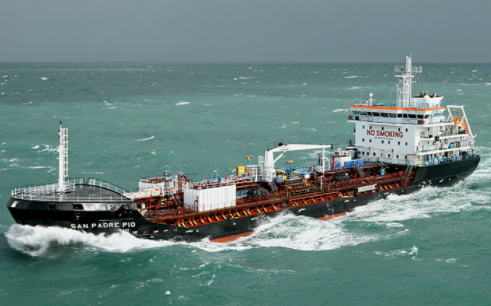
The Federal Government, on Tuesday, said it has successfully defended its right in a dispute against Switzerland over alleged oil theft in the Niger Delta region.
A statement issued by the Solicitor-General of the Federation and Permanent Secretary of the Federal Ministry of Justice, Dayo Apata, said it secured the nod of the International Tribunal for the Law of the Sea (ITLOS) to continue the criminal case it instituted against the Swiss-flagged oil tanker and its crew.
Apata disclosed that the Nigerian Navy arrested the oil tanker, its crew and cargo, for having violated Nigeria’s laws by engaging in ship-to-ship transfers of fuel oil for use in hydrocarbon production activities in Nigerian waters without the required permits and authorizations.
Briefing newsmen at the Ministry of Justice Headquarters, Apata said the arrested persons were handed over to the Economic and Financial Crimes Commission (EFCC) and subsequently charged before the Federal High Court in Port Harcourt, Rivers State.
He revealed that shortly after the trial commenced, Switzerland dragged Nigeria before the international tribunal, seeking to stop the criminal proceeding.
However, Apata said the ITLOS, on July 6, delivered ruling in favour of Nigeria by issuing “an order on provisional measures”.
He maintained that in view of the ruling, Nigeria would continue the prosecution of the Captain and three crew members of the ship that were arrested while operating illegally at “odd hours of the night”.
“The International Tribunal for the Law of the Sea (ITLOS) delivered an important ruling in favour of the Federal Republic of Nigeria in an Order on Provisional Measures, announced on 6th July 2019, in The MT San Padre Pio case (Switzerland v. Nigeria).
“The case concerns Nigeria’s arrest and detention of a Swiss-fIagged oil tanker, its crew, and cargo, for having violated Nigeria’s laws by engaging in ship-to-ship transfers of fuel oil for use in hydrocarbon production activities in Nigerian waters without the required permits and authorizations.
“On January 23rd, 2018, the Nigerian Navy arrested a Swiss-flagged vessel, the MT San Padre Pio, whilst undertaking a ship-to-ship transfer of fuel oil right inside a platform within the exclusive economic zone of Nigeria, without the pre-requisite permits or authorization and at odd hours of the night, contrary to Navy regulations.
“The vessel, crewmembers and cargo were subsequently handed over to the Economic and Financial Crimes Commission (EFCC) for prosecution.
“The EFCC is currently prosecuting the case at the Federal High Court, Port-Harcourt. The Captain and three other crewmembers were subsequently released on bail.
“In May 2019, Switzerland challenged Nigeria’s enforcement actions by instituting arbitral proceedings under Annex VII of the United Nations Convention for the Law of the Sea (UNCLOS).
“Switzerland also requested that ITLOS order the suspension of Nigeria’s criminal prosecutions of the vessel’s master and officers, not to institute new proceedings and that the cargo, crew and the vessel be released.
“In its 6th July 2019 order, the International Tribunal for the Law of the Sea (ITLOS) rejected Switzerland’s request that the prosecutions be suspended.
“The tribunal also conditioned the release of the vessel and the criminal defendants, who are Ukrainians, upon Switzerland’s posting of a bond or other financial security in the amount of US$14 million and on Switzerland’s giving unequivocal assurances, in the form of an undertaking binding under international law, that it guarantees their return to Nigeria, should Nigeria prevail in the arbitral proceedings.
“Nigeria’s Solicitor-General of the Federation and Permanent Secretary, Federal Ministry of Justice, Dayo Apata, hailed the tribunal’s decision as “a vindication of Nigeria’s right to proceed with prosecuting these serious violations of Nigerian law, which is a key part of its efforts to combat maritime crimes in the Gulf of Guinea.
“With the conclusion of the provisional measures phase before ITLOS, the parties will now proceed to adjudicate the underlying dispute at the Annex Seven arbitral tribunal”.
